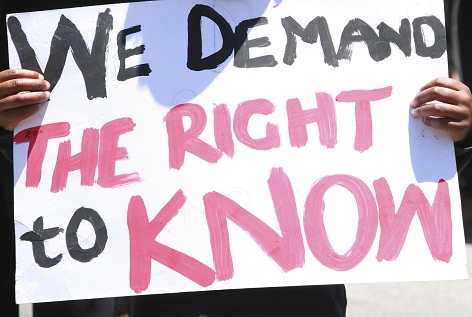Media ignores ‘man on the street’
This article below was published by The New Age:
Oct 18 2014 3:01PM

“The current crop of journalists could hardly write a story without being sensationalist,” he said. Picture: Gallo Images
The mainstream media are sensationalist and are ignoring average South Africans, a Right2Know (R2K) panel discussion in Durban heard on Saturday.
Sfiso Mahlase from the Izwe Lo Manzi FM community radio station told the panel that the average South African was “in the periphery because the media was egocentric”.
He accused Independent Newspapers of being “pro-white and capitalist” and lamented the quality of newspaper journalism.
“The current crop of journalists could hardly write a story without being sensationalist,” he said.
Mahlase also criticised the SABC saying it was simply a government mouth piece with its regional stations news broadcasts “all being read from the same script”.
He described the national broadcaster as being “an extension of the government’s public relations department”.
Independent Newspapers and SABC could not be immediately reached for comment.
Mahlase accused news organisations of failing to cover white collar crime.
“White collar crime is a European crime. White collar crime is protected because it benefits a certain racial group.”
Typical white-collar crimes include fraud, bribery, Ponzi schemes, insider trading, embezzlement, cybercrime, copyright infringement, money laundering, identity theft, and forgery.
The panel discussion was one of three events that the R2K campaign held across the country on Saturday.
In Cape Town, around 250 people marched to demand lower mobile call rates and media transformation.
R2K Western Cape co-ordinator Ghalib Galant said one purpose of the march was to protest against the high cost of connection.
They handed over memoranda of demands to Vodacom and MTN, calling for all mobile phone users to receive the lowest advertised rates.
Galant said the second purpose of the march was to call for “real” transformation in the media.
He said most printed media in the country was owned by four major media houses, one of them being the Independent Group.
At around noon, the march ended in front of Newspaper House, home to Independent Newspapers.
A memorandum of demands was addressed to Sekunjalo chairman Iqbal Surve, whose consortium bought Independent Newspapers last year.
The document stated that while it supported the group as a black-owned media entity; it was concerned that editorial freedom was under threat by managerial interference.
It referred to the sacking of Cape Times editor Alide Dasnois as one example of this perceived threat.
In Johannesburg, memoranda were expected to be delivered to the SABC and Media24.
-Sapa


